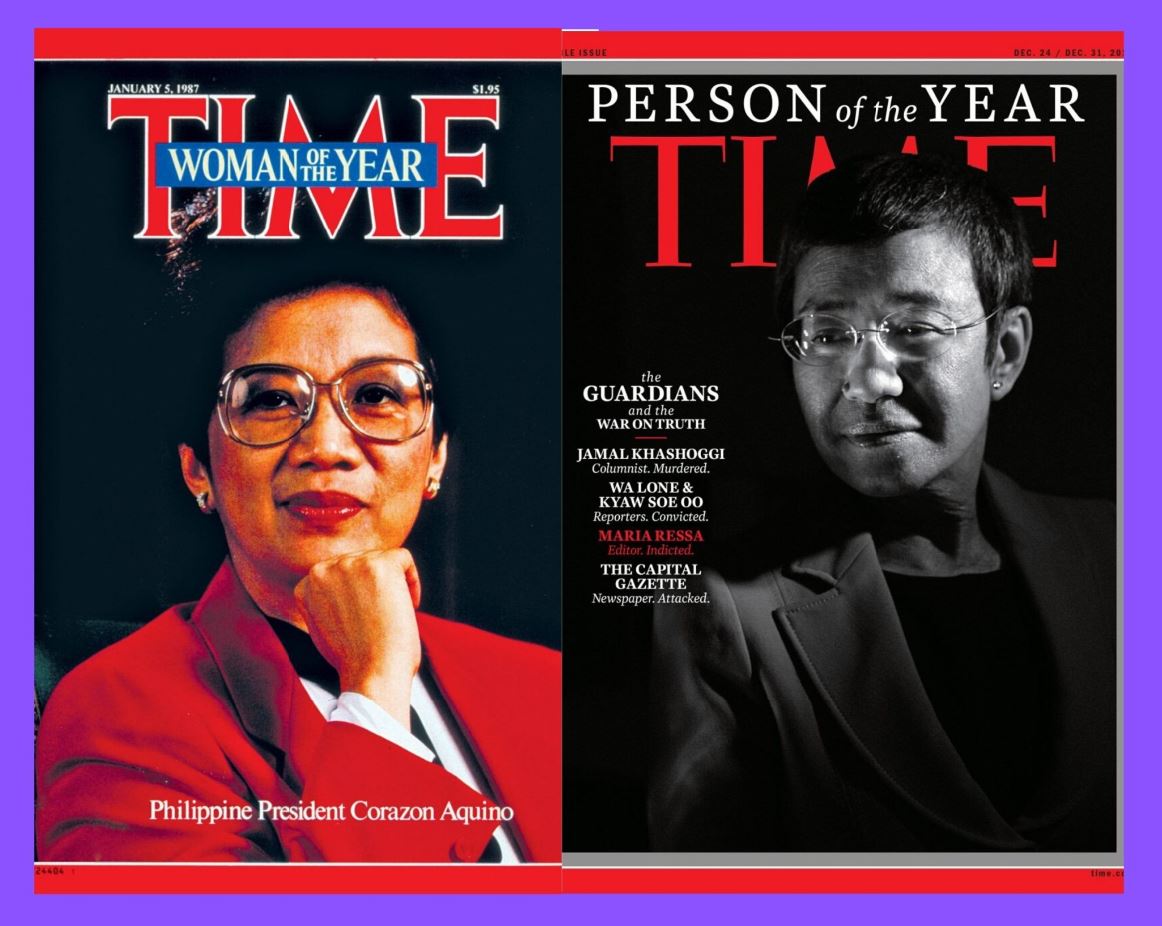Cory Aquino, Maria Ressa celebrated in TIME Magazine’s 100 Women of the Year
By: Angie Quadra-Balibay
|
Published on: March 8, 2020

TIME Magazine covers featuring President Corazon Aquino and journalist Maria Ressa.
Philippine President Corazon “Cory” Aquino and investigative journalist Maria Ressa, two of the most prominent Filipino women in contemporary times, were honored in TIME Magazine’s “100 Women of the Year” Special Issue listing the most influential women of the past century.
TIME’s introduction to the special edition released in time for International Women’s Month cited Corazon Aquino, the first woman president of the Philippines who championed People Power, as one of the “women who wore the crown, literal or not” along with Queen Soraya Tarzi of Afghanistan or Queen Elizabeth II of England, global stateswomen like Golda Meir, Indira Gandhi, and Margaret Thatcher.
“The women profiled here enlarged their world and explored new ones, broke free of convention and constraint, welcomed into community the lost and left behind. They were the different drummers, to whose beat a century marched without always even knowing it,” wrote Nancy Gibbs, a former editor-in-chief at TIME.
“So this special project is an act of discovery, and rediscovery, of the possibilities that come when we look and listen differently to the world these women made,” Gibbs adds about the TIME 100 Women of the Year released on March 5, 2020.
Here are the entries for the Filipinas in the TIME 100 Women of the Year:
1986: Corazon Aquino
There was a mythic quality to Corazon Aquino’s ascent. Well-born and a devout Catholic, she was a supportive wife to the Philippines’ most prominent critic of kleptocratic dictator Ferdinand Marcos, and seemingly harbored no political ambitions until her husband’s murder in 1983. She took over as leader of the opposition and won the presidency in 1986 after ordinary people gathered to protect soldiers who refused to stuff ballot boxes. TIME named her Woman of the Year. Filipinos went with “Mother of Democracy.”
That democracy has endured on the archipelago. So have its power structures: a tradition of elite rule helped her son Benigno Aquino III to a widely admired term as President. And his coarse, swaggering successor, Rodrigo Duterte, daily demonstrates both the machismo Corazon Aquino overcame, and the value of the principled civility she modeled. —Karl Vick
Corazon Aquino passed away in 2009 and her funeral was attended by thousands who mourned the loss of a Filipino icon.
2018: The Guardians: Maria Ressa
By 2012, Maria Ressa had already had an impressive career in news when she and three other women started Rappler, aiming to serve a Filipino population rapidly moving online. But the news site turned into a global bellwether for free, accurate information at the vortex of two malign forces: one was the angry populism of an elected President with authoritarian inclinations, Rodrigo Duterte; the other was social media.
In the Philippines, the Internet largely exists on Facebook, because the platform offers free data through its mobile app. But it fell to Ressa’s reporters to expose dozens of fake and spam-heavy accounts Duterte supporters used to manipulate the online discourse that many now mistake for reality. For her trouble, Ressa was subjected to an online hate campaign and multiple arrests.
TIME named Ressa a 2018 Person of the Year, including her with the staff of the Capital Gazette and others as a Guardian in the War on Truth. Since then, she has continued to navigate the murk between social media and despotism, calling out her findings to the rest of us at the risk of her life. —Karl Vick
Maria Ressa is the Rappler chief who has received multiple recognitions from international news associations that cited her journalism excellence and courage in the face of threats to press freedom.
SEND CHEERS in the comments below to the Filipina nation for having two of their Filipinas honored by TIME 100 Women of The Year!
Want to know how to be a Proud Pinoy? Like, Follow, Subscribe to GoodNewsPilipinas.com and our socials Facebook, Twitter, Instagram, Good News Pilipinas! TV on YouTube, for new story notifications and e-mail newsletters for updates on more Filipino Pride stories.